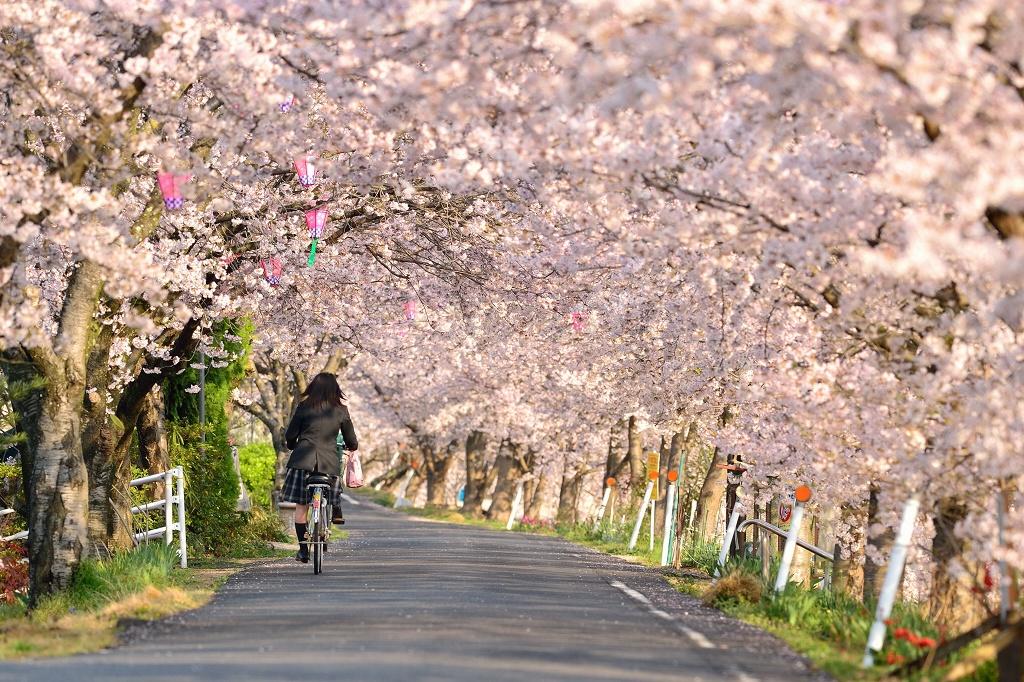The 99,000 cherry trees Japan to salve the sorrow of a tsunami
Row of cherry blossom trees.
Cherry blossom season has once again returned to Japan. While the arrival of the delicate pink flowers means social media is filling up with some incredibly beautiful photos, the bloom also represents a chance to reflect, hope, dream, and come to terms with loss.
In Iwaki, the project, called Iwaki Manbon Sakura (which roughly translates as “10,000 Cherry Tress of Iwaki”) represents just this.
Iwaki is a little more than 30 miles south of the stricken Fukushima Daiichi nuclear power complex. The community was stricken not only by the massive tsunami that struck Japan's Pacific coast following a massive earthquake in March 2011, but also by the nuclear disaster at the Fukushima power plant, about 30 miles away.
As part of the Iwaki Manbon Sakura Project, to mark the fourth anniversary of the massive disaster, the group hopes to plant 99,000 cherry trees on a hill overlooking the city (the “10,000″ number in the group's name is a poetic, term that can sometimes mean “many” or “infinite). Tadashige Shiga, whose company helps sponsor the project explains:
"The effects of the March 2011 disaster have left a pall of sadness here. So let's do something to fix that! Every year the cherry trees blossom. So let's give kids 20 years from now, 30 years from now something to look upon when they gaze up at the mountain slopes above Iwaki. Even if for some reason no one can live in Iwaki, we can still express the love we all feel for our city for all time, and we can do that by planting cherry trees."
The idea is that cherry trees and their spring blossoms will be able to soothe some of the memories of terror and sadness caused by the 2011 tragedy.
Sakura's long history
Japan's connections with cherry blossoms, or sakura, run deep. The short-lived blooms appear in the Man'yōshū, the oldest existing collection of Japanese poetry, written nearly 1,300 years ago during Japan's Nara period.
Throughout Japan's history cherry blossoms have represented new beginnings, hopes and dreams. The blossoms are beautiful enough to take one's breath away and then quickly disappear. Cherry blossoms stir a mixture of emotions and occupy a special place in the hearts of Japanese people.
Today the arrival of cherry blossoms each year in late March marks more than a change of season. Cherry blossoms also coincide with graduation and the end of the school year at the end of March, and the start of a new school year at the beginning of April.
This season, Japanese Twitter users have posted some stunning pictures of sakura in bloom:
"Spring has arrived."
"The cherry trees beneath Tokyo Skytree are nearly in full bloom."
Twitter user @7D_ITACHI managed to capture a timeless image of Japan:
"Back home in Joetsu for the first time in four years. It's really peaceful here."
As the sakura bloom it's the season of new journeys:
"It's always wonderful in spring as the beautiful sakura are in bloom. While I have always loved springtime at the moment I'm hating it as I have to leave old friends behind."
As the cherry petals begin to fall in drifts, they begin to express a powerful sense of separation:
"A blizzard of cherry blossoms” > Cherry blossom lie in drifts in temple grounds. (Kokugon Temple, Nagano)"
Cherry blossoms seem to have a profound effect on the human soul.
"I have spotted the first cherry trees of the season! Although I'm pretty tired, I think I can keep on going on for a little while longer."
This story was cross-posted at Global Voices, a community of 1,200 bloggers and reporters worldwide.
Izumi Mihashi contributed to this post.
UPDATE: A previous version of this story had a mistake in the English translation. As a matter of fact, the 99,000 cherry trees is a long-term plan in this project, not the number currently planted. The number of cherry trees already planted is only above 3,000.
